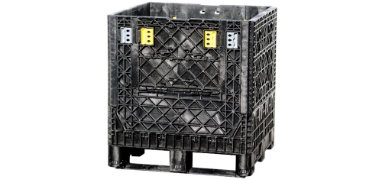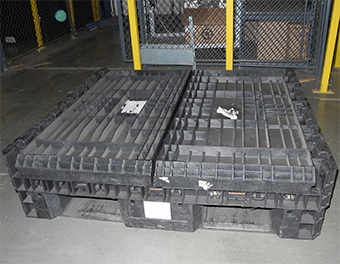Compare refurbished bulk containers and used bulk containers for cost-saving solutions
Wiki Article
Why Bulk Containers Are Important for Lasting and Affordable Transport
Bulk containers play an essential role in modern-day logistics. They help with the effective movement of huge amounts of products, therefore maximizing transportation processes. This technique not only minimizes costs yet also decreases ecological impact with reduced emissions and waste generation. As sectors seek more lasting techniques, the fostering of bulk containers is coming to be significantly significant. What effects does this shift hold for future logistics and supply chain management?
The Advantages of Utilizing Mass Containers in Logistics
Bulk containers reinvent logistics by boosting performance and sustainability. These containers permit the transportation of big amounts of products in a single journey, noticeably decreasing the variety of trips called for. This not just simplifies procedures yet also lessens labor costs related to handling, loading, and discharging. Additionally, mass containers are made to enhance area application within transportation vehicles, making sure that even more products can be delivered at the same time.The standardization of bulk containers likewise streamlines the logistics procedure. With consistent dimensions, they can be quickly stacked and stored, leading to boosted storehouse management. Moreover, mass containers often include resilient materials that protect materials from damages throughout transportation, therefore reducing item loss and enhancing total integrity. As a result, businesses can experience enhanced supply chain performance, inevitably resulting in raised earnings and client fulfillment. This combination of factors makes bulk containers an important property in modern logistics.
Environmental Impact: Decreasing Waste and Carbon Footprint
As markets increasingly prioritize sustainability, the fostering of bulk containers has emerged as a crucial strategy for reducing waste and decreasing carbon footprints. These containers lessen making use of packaging products, such as boxes and plastic, thus significantly reducing total waste generation. By consolidating deliveries, mass containers improve transport performance, enabling for more products to be transferred per trip. This decrease in journeys straight correlates with reduced greenhouse gas discharges, adding to a smaller carbon impact.Mass containers can typically be recycled or recycled, additionally alleviating environmental influence. The toughness of these containers warranties they can stand up to numerous transportation cycles, reducing the requirement for single-use choices. used plastic containers. By improving logistics and advertising reliable resource use, mass containers not just support sustainable techniques however likewise encourage sectors to straighten with worldwide environmental objectives. Ultimately, their execution shows a dedication to eco-friendly stewardship and liable resource administration
Price Financial Savings: Exactly How Bulk Containers Lower Transport Expenses
While many business seek means to boost their profits, the use of bulk containers presents a considerable opportunity for lowering transport expenditures. Mass containers optimize the quantity of items transported, enabling companies to deliver bigger quantities at the same time. This efficiency reduces the variety of journeys needed, directly reducing fuel expenses and decreasing labor costs connected with loading and unloading.In addition, bulk containers often include structured designs that enhance space utilization within transport automobiles. This means less empty rooms, resulting in extra efficient use offered capacity. Additionally, the durability of bulk containers can lower the threat of product damage during transportation, making certain and lowering losses that even more goods arrive intact.
Enhancing Supply Chain Effectiveness With Mass Storage Solutions
Bulk storage options play an important duty in boosting supply chain effectiveness by maximizing stock administration. By settling items right into fewer, bigger containers, companies can substantially reduce managing costs related to frequent transfers and processing. This streamlined technique permits far better tracking and monitoring of supply, eventually causing improved functional efficiency.Structured Stock Monitoring
Reliable stock monitoring is essential for optimizing supply chain procedures, especially when companies adopt bulk storage space remedies. These services make it possible for businesses to keep higher stock levels while reducing the regularity of replenishment. By consolidating products right into bulk containers, business can enhance their stock processes, lowering the intricacy connected with tracking several smaller plans. This method assists in accurate stock matters and improves forecasting accuracy, permitting more enlightened decision-making. Furthermore, mass storage services streamline storage facility company, making it much easier to situate and gain access to items when needed. Because of this, companies can attain a more effective supply turn over price, ultimately improving total supply chain efficiency and lowering the possibility of stockouts or overstock situations.
Minimized Handling Prices
The implementation of mass storage remedies not only streamlines inventory monitoring yet also considerably reduces managing expenses across the supply chain. By consolidating products into bulk containers, business lessen the demand for frequent handling and transfer in between different storage space and transportation systems. This technique lowers labor expenses related to loading, unloading, and moving smaller sized packages. Additionally, bulk storage space reduces the frequency of shipments, leading to reduced transport expenses and decreased fuel usage. Because of this, organizations can enhance their logistics operations, allowing for an extra reliable appropriation of resources. Ultimately, minimized handling expenses add to boosted total supply chain effectiveness, promoting a setting that sustains both sustainability and financial viability.
Versatility of Mass Containers Across Numerous Industries
Many industries have distinct demands for transportation and storage, mass containers have actually arised as a functional option that meets a large variety of requirements. These containers, varying from huge containers to specialized tanks, can accommodate varied materials, including powders, granules, and liquids. In the farming sector, bulk containers help with the transportation of plant foods and grains, while the food and drink sector utilizes them for active ingredients and ended up items. The chemical industry counts on mass containers for safely transporting unsafe materials, guaranteeing compliance with safety and security laws. In addition, building companies gain from bulk containers for transferring aggregates and other products. Their adaptability reaches different settings of transport, consisting of trucks, ships, and trains, improving logistical effectiveness. This convenience not just improves procedures throughout different markets but additionally promotes sustainability by reducing packaging waste and optimizing room in transit. As a result, mass containers play a necessary duty in modern-day supply chain administration.Future Trends wholesale Container Use and Sustainability
The future of bulk container use is increasingly shaped by ingenious materials growth that enhances sustainability. Additionally, automation in logistics promises to streamline procedures, minimizing waste and enhancing effectiveness. Accepting round economic climate methods will certainly additionally revolutionize how bulk containers are made, used, and reused, fostering a more lasting transport landscape.Cutting-edge Products Growth
As industries significantly prioritize sustainability, ingenious materials growth in bulk containers becomes a significant consider improving environment-friendly transport options. Suppliers and researchers are exploring eco-friendly plastics, recycled composites, and light-weight metals to lower ecological influence. These products not just lessen waste yet likewise improve gas effectiveness by reducing the overall weight of containers. Additionally, developments in clever products, which can adapt to varying problems, boost the sturdiness and capability of bulk containers. The combination of these innovative materials aligns with round economic climate principles, advertising reuse and recycling. As the need for sustainable techniques grows, the growth of such products will play a crucial duty in forming the future of bulk container use in logistics and transportation.Automation in Logistics
Substantial improvements in automation are positioned to change logistics and the application of bulk containers, improving sustainability in transportation. Automated systems, including drones and autonomous automobiles, are enhancing a fantastic read the activity of bulk containers, lowering the reliance on conventional fuel-powered transportation. These innovations optimize directing and filling processes, reducing vacant miles and improving gas effectiveness. Additionally, automated stock administration systems improve tracking and monitoring of bulk containers, guaranteeing far better resource allocation and reduced waste. The assimilation of the Net of Things (IoT) permits real-time information analysis, enabling proactive decision-making that lines up with sustainability objectives. As automation proceeds to develop, it is expected to drive further innovations in bulk container usage, inevitably supporting more lasting logistics practices and minimizing the ecological impact of transportation.Circular Economic Situation Practices
Innovations in automation are establishing the phase for an extra integrated method to circular economic climate practices in the domain name of mass container usage. As markets progressively accept sustainability, mass containers are being made for longevity and reusability. This shift not just lessens waste but also enhances resource efficiency. Firms are taking on strategies such as closed-loop systems, where made use of containers are gathered, refurbished, and reestablished right into the supply chain. In addition, smart technologies track container life cycles, facilitating far better administration and reducing ecological influence. The collaboration between producers, logistics service providers, and end-users is essential in establishing requirements for lasting container usage. used collapsible bulk containers. Future patterns use this link show an expanding emphasis on materials that are recyclable and eco-friendly, further reinforcing the circular economy's concepts in mass transportation
Frequently Asked Concerns
What Materials Are Mass Containers Usually Made From?
Mass containers are generally built from durable materials such as high-density polyethylene, steel, light weight aluminum, and cardboard. These products give convenience, security, and strength, making them appropriate for moving different goods in different industries efficiently.How Do I Choose the Right Dimension Mass Container?
Selecting the appropriate dimension mass container includes examining the volume of materials to be delivered, taking into consideration taking care of devices compatibility, and appraising storage space needs. Correct size assurances efficiency in transport and minimizes waste during shipment.Are Mass Containers Reusable or Recyclable?
Bulk containers are commonly reusable, created for multiple journeys, improving sustainability. Numerous can also be reused, relying on the materials made use of. Picking recyclable choices additionally minimizes and sustains ecological objectives waste in transportation practices.What Security Rules Put On Mass Container Transport?
Security policies for bulk container transportation include conformity with the Division of Transport standards, appropriate labeling of harmful products, architectural integrity evaluations, and adherence to weight limits to ensure secure handling and avoid mishaps during transportation.Just How Can Companies Change to Using Bulk Containers Successfully?
Services can transform to bulk containers by reviewing present logistics, educating staff on handling, buying suitable equipment, enhancing supply management, and collaborating with suppliers to ensure compatibility and efficiency throughout the supply chain.
As sectors significantly focus on sustainability, the adoption of bulk containers has arised as a key method for decreasing waste and lowering carbon footprints. By combining products right into mass containers, firms can enhance their inventory processes, reducing the intricacy connected with tracking several smaller sized packages. As markets progressively click to read more focus on sustainability, ingenious products advancement in mass containers emerges as a considerable factor in improving environment-friendly transportation remedies. Automated systems, consisting of drones and independent lorries, are simplifying the motion of mass containers, decreasing the reliance on standard fuel-powered transport. In addition, automated supply administration systems boost tracking and surveillance of mass containers, making sure far better resource appropriation and minimized waste.
Report this wiki page